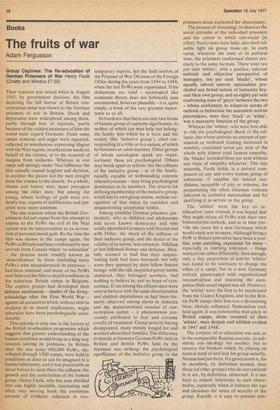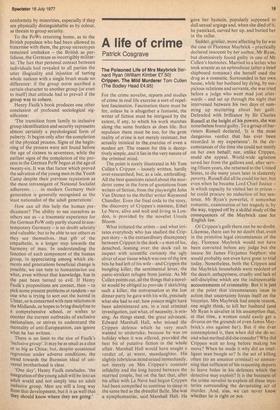Books
The fruits of war
Adam Fergusson
Group Captives: The Re-education of German Prisoners of War Henry Faulk (Chatto and Windue £7,50) Their reaction was mixed when in August 1945, by government decision, the film depicting the full horror of Belsen concentration camp was shown to the German prisoners of war in Britain. Shock "and depression were widespread among them, partly through fear of reprisals, partly because of the sudden awareness of how the world must regard Germans. From sOme camps 'remorse and anger were reported, reflected in manifestoes expressing disgust with the Nazi regime, in collections made on behalf of the victims, or in the removal of insignia from uniforms. Whereas in one camp still strongly under Nazi influence the film actually caused laughter and derision, in another the pastor led the men straight from the cinema to the church. As a whole, shame and horror were more prevalent among the older men ; but among the young, whose feelings of guilt were evidently less, reports of indifference and cynicism were more common.
The one reaction which the British Government did not expect from this attempt to expose to the PoWs the evil of the Nazi system was its interpretation as an accusation of personal moral guilt. By the time the film was shown in the camps again, the PoWs in Britain had been reinforced by new arrivals from Canada where 're-education'
the process more crudely known as 'denazification' by those (including many PoWs) who misunderstood its purposes — had been minimal; and many of the PoWs now believed the film to depict conditions in the notorious British • camps in Belgium. The captive groups had developed their defence mechanism — shades of the Kriegschuldstage after the First World War — against an accusation which, without time to readjust to its moral implications, might otherwise have been psychologically unendurable.
This episode is only one in the history of the British re-education programme which suggests that greater understanding of the human condition would bring us a long way towards solving its problems. In Britain after the war some 400,000 PoWs, distributed through 1500 camps, were held in conditions as close as can be imagined to a human laboratory, and it was practicable as never before to study there the collapse, the growth and the constitution of the human group. Henry Faulk, who has now distilled into one highly readable, fascinating and often very moving book the enormous amount of evidence collected in con
temporary reports, led the field section of the Prisoner of War Division of the Foreign Office during the years from 1944 to 1948, when the last PoWs were repatriated. If his deductions are valid — sociological like economic theory does not habitually pass uncontested, however plausible — it is, quite simply, a book of the very greatest importance to uS all.
Its burden is that there are only two forms of human group of supreme significance,to neither of which can man help but belong: the family into which he is born and the society (the 'inclusive group'), often corresponding to a tribe or to a nation, of which he becomes an adult member. Other groups of whom sociologists speak are organisational: these are psychological. Others may break apart or reform: but the collapse of the inclusive group — as of the family, equally capable of withstanding extreme internal pressure — may bring psychological destitution to its members. The criteria foy defining membership of the inclusive group, which has its own group norms, include recognition of that status by outsiders and unquestioning acceptance within.
Among youthful German prisoners particularly, who as children and adolescents had never known democracy and who totally identified Germany with Nazism and with Hitler, the shock of the collapse of their inclusive group, and the denial of the validity of its norms, was complete. Nihilism at last followed dismay and defiance. Mentally stunned to find that their unquestioning faith had been betrayed, not only were they spurned by their fellow human beings: with the old, respected group norms shattered, they belonged nowhere, had nothing to believe in, and no hope of reassurance. Even among the officers men were seen to behave with the same disorientation and childish dependence as had been formerly observed among slaves in America and the depersonalised inmates of concentration camps — a phenomenon previously attributed to fear and extreme cruelty of treatment. Group security having disappeared, many merely longed for and worried about their families. The difference in morale as between German PoWs held in Britain and British PoWs held by the Japanese was striking: the psychological significance of the inclusive group to the prisoners alone explained the discrepancy. The process of 'screening', to discover the social attitudes of the individual prisoners and the extent to which anti-social (in effect, Nazi) views were held, also shed valuable light on group make-up. In each camp, whatever the state of its political tone, the prisoners conformed almost precisely to the same formula. There were ten per cent 'whites', with a positive, tolerant outlook and objective perspective of humapity; ten per cent 'blacks', whose equally inborn narrow nationalism precluded any broad notion of humanity beyond their own group; and an eighty per cent conforming mass of 'greys' between the two — whose conformity to whatever norms of outlook or behaviour the ascendent activist pacemakers, were they 'black' or 'white', was a necessary function of the group.
Whereas the 'whites', who were best able to ride the psychological shock Of the collapse, but whose activists no amount of persuasion or technical training increased in number, contained seven per cent of the whole with almost total human empathy, the 'blacks' included three per cent without any trace of empathy whatever. This tiny minority, Faulk holds, is a natural component of any and every human group of substance: it supplies the natural candidates, incapable of pity or remorse, for perpetrating the often inhuman violence inherent in exclusive nationalism and for justifying it as service to the group.
The 'whites' were the key to reeducation: once trained, it was hoped that they might infuse all PoWs with their own humanitarian outlook, and so in time provide the yeast for a new Germany which would study war no more. Although being a PoW in Britain proved to have been a positive, even enriching, experience for many — especially in learning tolerance — things worked out rather differently. Sure enough, only a tiny proportion of activist 'whites' was found to be necessary to change the ethos of a camp; but in a new Germany entirely preoccupied with organisational reconstruction and resenting the occupation their social impact was nil. However, the 'whites' were the first to be repatriated from the United Kingdom, and to the British PoW camps their loss was a devastating blow. Morale collapsed. Nationalism took hold again. It was noteworthy that solely in British camps, alone creamed of their 'whites', were despair and nihilism evident in 1947 and 1948.
The purpose of re-education was not, as in the comparable Russian exercise, to substitute one ideology for another, but to remove the blinkers which, by playing on natural need of and fear for group security, Nazism had put there. If a group norm is, for its members, by definition normal, then those (of other groups) who do not conform to it are, by definition, abnormal. It is not hard to impute inferiority to such abnormality, especially when it bolsters the ego and increases the sense of security of the group. Equally it is easy to present non conformity by minorities, especially if they are physically distinguishable as by colour, as threats to group security.
To the PoWs returning home, as to the British populace who had been allowed to fraternise with them, the group stereotypes remained unshaken — the British as perfidious, the Germans as incorrigibly militarist. The fact that personal contact between individuals had revealed to all parties the utter illogicality and injustice of tarring whole nations with a single brush made no difference: if the group norm ascribed a certain character to another group (or even to itself) that attitude had to prevail if the group was to cohere. Henry Faulk's book produces one other conclusion of profound sociological significance: 'The transition from family to inclusive group identification and security represents almost certainly a psychological form of puberty. It begins only after the completion of the physical process. Signs of the begin:. ning of the process were not found before the age of sixteen to seventeen, while the earliest signs of the completion of the process in the German PoW began at the age of twenty-six. It was that factor which proved the salvation of the young men in the Youth Camp despite their previous reputation as the most intransigent of National Socialist adherents . . . in modern Germany their generation is generally recognised as the least nationalist of the adult generations'.
How can all this help the human predicament? The ability to see ourselves as others see us — a traumatic experience for the German PoW only partly shared in contemporary Germany — is no doubt salutary and valuable; but to be able to see others as they see themselves, that gift of the empathetic, is a longer step towards the harmony of man. In understanding the function of each component of the human group, in appreciating among which elements and generations beneficial change is possible, we can turn to humanitarian use what, even without that knowledge, has in the past been turned to evil. If Henry Faulk's propositions are correct, then — to pick some present problems at random — no one who is trying to sort out the hatred in Ulster, or is concerned with race relations in the Midlands, or hopes to bring discipline to a comprehensive school, or wishes to counter the current outbreaks of exclusive nationalism, or strives to understand the mentality of anti-Europeanism, can ignore what he has written.
There is no limit to the size of Faulk's 'inclusive group'. It may be as small as a clan or as big as China; but, despite occasional regression under adverse conditions, the trend towards the Burnsian ideal of universal brotherhood is clear.
'One day', Henry Faulk concludes, 'the integration of the young adult will be intd an adult world and not simply into an adult inclusive group. Men are still a long way from that development, but it is as well that they should know where they are going.'



































 Previous page
Previous page